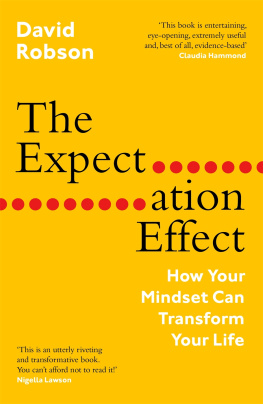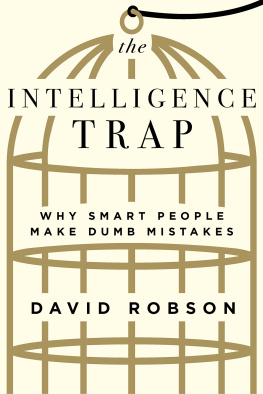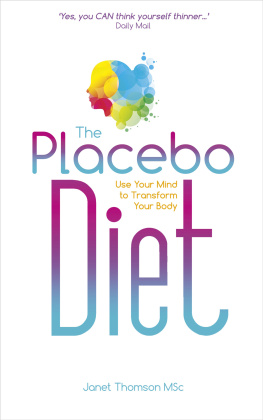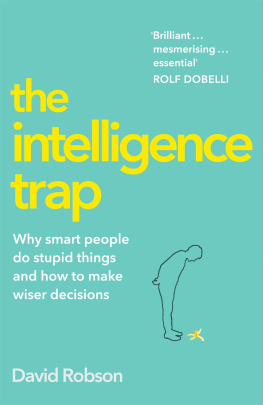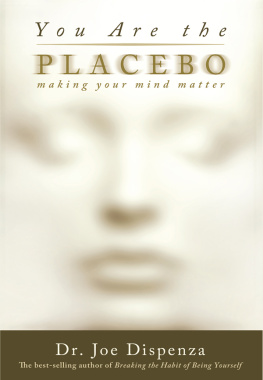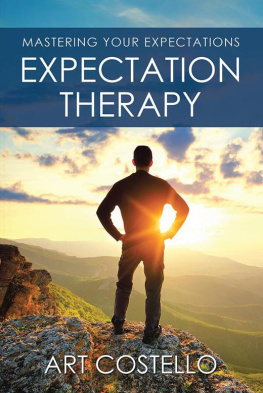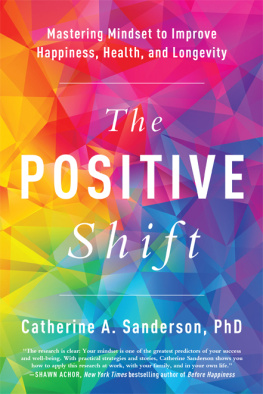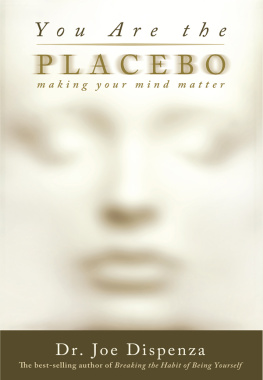INTRODUCTION
The mind is its own place and in itself, can make a Heaven of Hell, a Hell of Heaven.
JOHN MILTON, PARADISE LOST
Our expectations are like the air we breathe they accompany us everywhere, yet we are rarely conscious of their presence. You might assume that your body is resilient, or that it is prone to sickness. You might think you are naturally lean and sporty, or that you are predisposed to gaining weight. You might believe that the stresses in your life are harming your health, and that a night of poor sleep will render you a walking zombie the next day.
These assumptions may appear to be inescapable, objective truths. But in this book I want to show you how those beliefs, in themselves, are shaping your health and well-being in profound ways, and that learning to reset our expectations about these issues can have truly remarkable effects on our health, happiness and productivity.
Dont believe me? Then consider one attention-grabbing study from Harvard University. The participants were hotel cleaners, whose work is often physically intense, yet feels very different from the exercise you might perform at the gym. To change the cleaners perceptions of their own fitness, the researchers explained that the amount of energy that was exerted by hoovering the floor, changing beds or moving furniture over the course of a week easily amounts to the level of exercise recommended for good health. One month later, the researchers found that the cleaners fitness had noticeably improved, with significant changes in their weight and blood pressure. Quite amazingly, the shift in their
We will discover how expectation effects like this can also influence our susceptibility to illness, our ability to maintain a stable body weight, and the short- and long-term consequences of stress and insomnia. As the following story shows, the power of expectation is so strong that it can even determine how long you live.
* * *
Beginning in the late 1970s, the US Centers for Disease Control began to receive reports that a worrying number of recent Laotian immigrants were dying in their sleep. They were almost all male, aged between their mid-20s and mid-40s, and most were from the persecuted Hmong ethnic group, who had fled Laos after the rise to power of the communist political movement Pathet Lao. For their loved ones, the only warning was the sound of them struggling for breath and, occasionally, a gasp, a moan or a cry. By the time help arrived, however, they were already dead.
Try as they might, epidemiologists could find no good medical explanation for this Sudden Unexpected Nocturnal Death Syndrome. Autopsies showed no evidence of poisoning, nor was there anything particularly unusual about their diet or their mental health. At its peak, however, the mortality rate was so high among young Hmong men that SUNDS accounted for more lives lost than all the other top five causes of death combined. Why were so many seemingly healthy adults passing away in their sleep?
Investigations by the medical anthropologist Shelley Adler would eventually solve the mystery. According to Hmong traditional folklore, an evil demon called the dab tsog roamed the world at night. When it found its victim, it would lie on the body, paralysing them and smothering their mouth until they could no longer breathe.
Back in the mountains of Laos, the Hmong could ask a shaman to make a protective necklace, or they could sacrifice animals to appease their ancestors, who would fend off the dab tsog. But now these men were in the United States, there were no shamans and they were no longer able to perform their ritual sacrifices to appease their ancestors, meaning they had no protection from the dab tsog. Many had converted to Christianity, so that they could better integrate into American culture, neglecting their old rituals altogether.
Guilt at having abandoned their traditions was itself a source of chronic stress that could have harmed their overall health. But it was at night that the fears of the dab tsog became a reality. Disturbing nightmares resulted in the experience of sleep paralysis, in which the mind becomes conscious, as if you were fully awake, but the body is unable to move. Sleep paralysis is not, in itself, dangerous it affects around 8 per cent of people.
Newspaper reports at the time described the cultural primitivity of these people, who were frozen in time and ruled by superstition and myth. But scientists now argue that we are all susceptible to beliefs that are just as potent as the dab tsog. You may not believe in demons, but thoughts about fitness, and expectations about long-term health, may have real consequences for your longevity, including the risk of heart disease. This is the enormous power of the expectation effect. It is only once we recognise its influence that we can begin to use it to our advantage to ensure a longer, healthier, happier life.
These provocative claims may sound dangerously close to the content of many New Age self-help books, such as Rhonda Byrnes 35-million-copy bestseller The Secret. Byrne promoted the law of attraction the idea that, for example, visualising yourself rich will bring more money into your life. Such ideas are pure pseudoscience, whereas the findings in this book are all based on robust experiments, published in peer-reviewed journals, and they can all be explained by well-accepted psychological and physiological mechanisms, such as the actions of the nervous and immunological systems. We will learn how our beliefs can influence many important life outcomes without any appeal to the paranormal.
You may also wonder how the content of our thoughts could have any meaningful influence in the chaos of the world today. I wrote much of this book in the midst of the Covid-19 pandemic, when many of us were grieving for loved ones and fearing for our livelihoods. We have also faced huge political uncertainty and unrest, and many continue to wrestle with enormous structural inequalities. Our own expectations and beliefs may seem to hold little power in the face of all these barriers.
It would be foolish to argue that positive thinking could eliminate all this unhappiness and anxiety and I would be the last person to make that claim. (Scientific research continues to show that simply denying the difficulties of a situation will only lead to worse outcomes.) As we shall soon see, however, there are many ways that our beliefs about our own capacities can influence how we cope with challenges, and determine the toll they take on our physical and mental health. While many of todays crises are beyond our control, our responses to difficult situations are often the product of our expectations and understanding this fact allows us to increase our resilience and to react in the most constructive way to the problems we face.
Crucially and this is something that I will emphasise throughout the book the expectation effects described in these chapters concern specific beliefs rather than a general optimism or pessimism. Armed with scientific knowledge about the ways your expectations are shaping your life, you can learn to reframe and reappraise your thinking without any self-deception, and you dont need to turn into a cheery Pollyanna to benefit.
* * *
My own understanding of the enormous power of expectations came seven years ago, during a period of turmoil in my own life.
Like many people, I had previously suffered from depression and anxiety, but for most of my life I had managed to weather the waves of unhappiness until they passed. Then, after a period of intense stress, the troughs in my mood started to get deeper, and longer, to the point that they were no longer bearable.
Recognising those symptoms, I went to my GP, who prescribed me a course of anti-depressants and offered some of the usual warnings about the known side effects, including migraine. Sure enough, my mood seemed to stabilise, but on those first few days I also experienced splitting headaches that felt like an ice-pick had penetrated my skull. The pain was so intense that I was sure that something terrible was happening to my brain. How could this agony not be some kind of warning?

